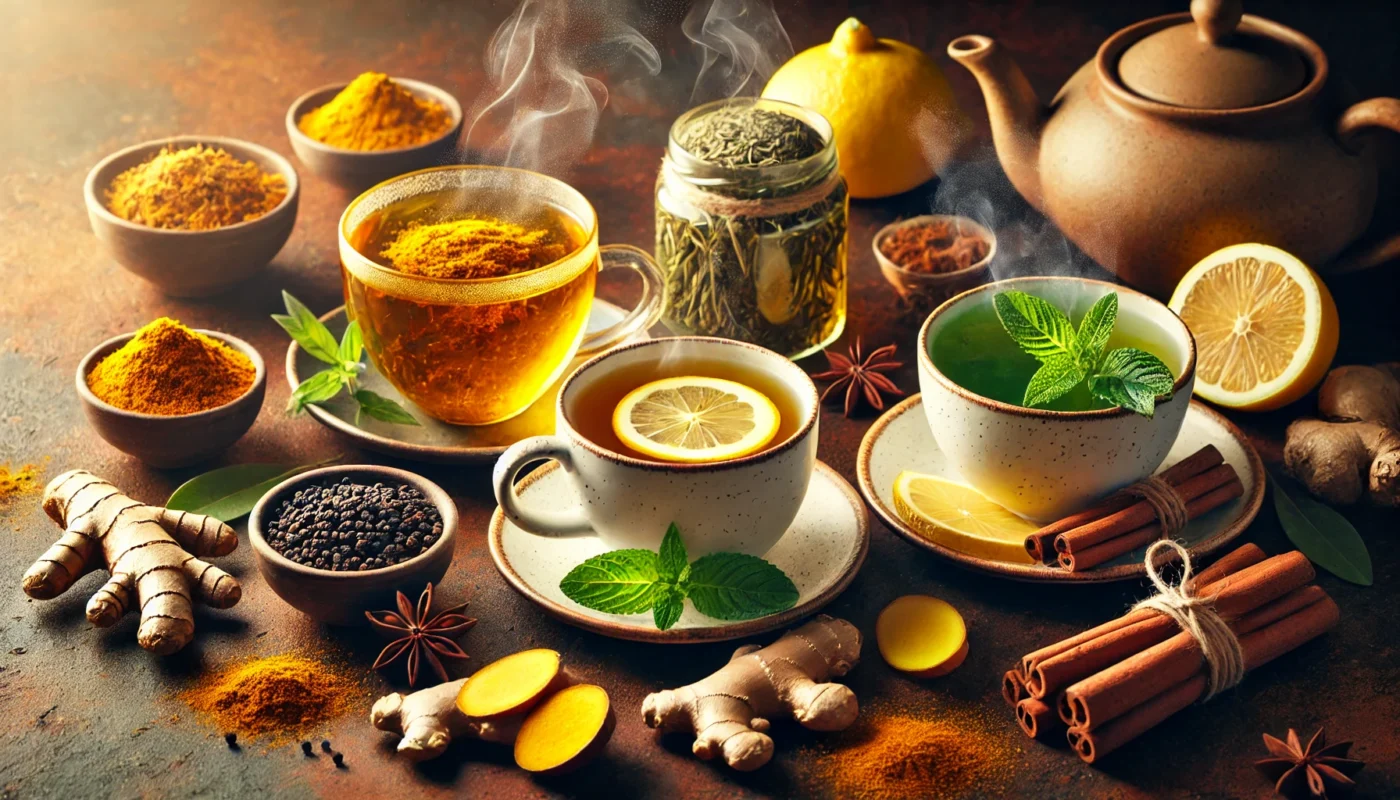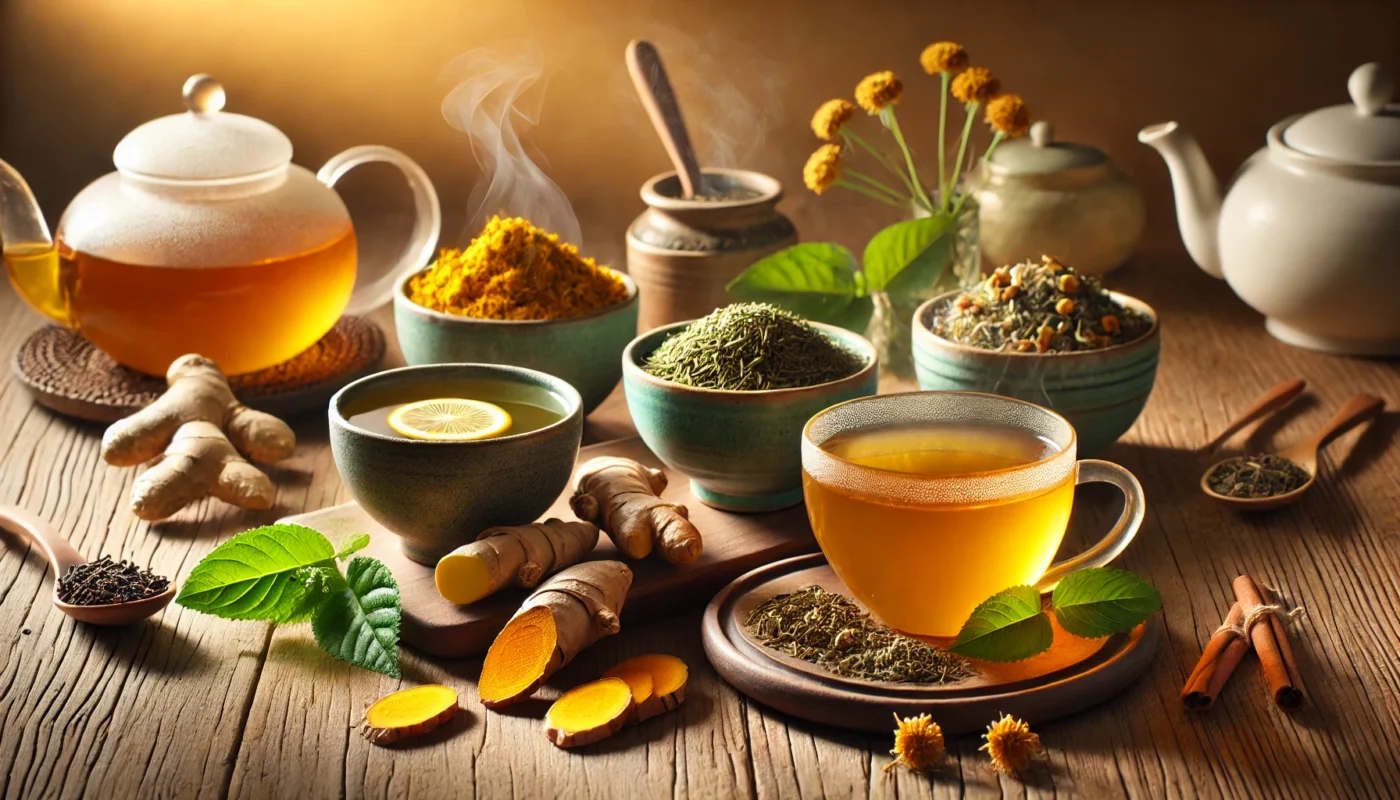Before we delve into specific teas, it’s important to understand how inflammation works and why tea is a beneficial choice for combating it. Inflammation is essentially the body’s defense mechanism. However, when it becomes chronic, it can cause damage. This is where the anti-inflammatory properties of certain teas come into play. Teas contain bioactive compounds like polyphenols and flavonoids, which have been shown to reduce inflammatory markers in the body.
You may also like: 20 Powerful Anti-Inflammatory Foods
The Mechanism of Inflammation
Inflammation is the body’s way of signaling the immune system to heal and repair damaged tissues. It is a complex biological response involving immune cells, blood vessels, and molecular mediators. Acute inflammation is necessary for healing, but when the process doesn’t turn off, it becomes chronic, potentially leading to tissue damage and various health problems.
Role of Polyphenols and Flavonoids
Polyphenols and flavonoids are natural compounds found in teas that play a significant role in reducing inflammation. These antioxidants help neutralize free radicals in the body, preventing oxidative stress, a known contributor to chronic inflammation. By decreasing oxidative stress, these compounds help maintain cellular health and reduce the risk of inflammatory diseases.
Tea as a Functional Beverage
Tea is more than just a comforting drink; it is a functional beverage with potential health benefits. The bioactive compounds in tea not only support the immune system but also provide additional health benefits, such as improving cardiovascular health and supporting metabolic functions. This makes tea a versatile addition to a balanced diet, particularly for those seeking natural ways to manage inflammation.
Green Tea: A Potent Anti-Inflammatory Beverage
Green tea is widely recognized for its health benefits, particularly its anti-inflammatory properties. It is a staple in many cultures, celebrated for its refreshing taste and medicinal qualities.
The Science Behind Green Tea
When discussing tea and inflammation, green tea often tops the list. It’s renowned for its high concentration of epigallocatechin gallate (EGCG), a potent antioxidant that has been extensively studied for its anti-inflammatory effects. Research suggests that EGCG can inhibit the production of inflammatory cytokines, thus reducing inflammation.
EGCG and Its Impact on Health
Epigallocatechin gallate (EGCG) is the most abundant catechin in green tea. Studies have shown that EGCG not only reduces inflammation but also has anticancer, neuroprotective, and cardiovascular benefits. Its ability to modulate signaling pathways related to inflammation makes it a critical component of green tea’s health-promoting properties.
Clinical Studies Supporting Green Tea
Numerous clinical studies have demonstrated the effectiveness of green tea in reducing inflammation. For instance, regular consumption of green tea has been linked to lower levels of C-reactive protein (CRP), a marker of inflammation in the body. These findings support the role of green tea as a valuable addition to an anti-inflammatory diet.
Antioxidant Synergy in Green Tea
Green tea contains a unique combination of antioxidants that work synergistically to enhance its anti-inflammatory effects. The presence of other catechins, such as epicatechin and epicatechin gallate, alongside EGCG, boosts the overall antioxidant capacity of green tea, making it a powerful ally against inflammation.
Benefits and Practical Use
Green tea is not just a soothing beverage; it provides a multitude of health benefits. For those wondering, “Does green tea help with inflammation?” the answer is a resounding yes. Regular consumption can help manage inflammation-related pain and improve overall health. Incorporating 2-3 cups of green tea into your daily routine can be a simple yet effective way to leverage its anti-inflammatory properties.
Managing Inflammation-Related Pain
Individuals suffering from chronic inflammatory conditions, such as arthritis, may find relief through regular green tea consumption. The anti-inflammatory compounds in green tea help reduce joint pain and stiffness, improving mobility and quality of life.
Enhancing Daily Health Regimens
Incorporating green tea into your daily routine can be as simple as replacing your morning coffee or afternoon soda with a cup of green tea. This small change can have significant health benefits, particularly for those aiming to reduce inflammation naturally.
Tips for Brewing the Perfect Cup
To maximize the benefits of green tea, pay attention to brewing methods. Use fresh, cold water and avoid boiling the tea leaves to preserve the delicate catechins. Steep for 2-3 minutes and enjoy the subtle flavors and health benefits that come with each cup.
White Tea vs. Green Tea: Which is More Anti-Inflammatory?
Both green and white teas are derived from the Camellia sinensis plant, yet they differ in processing and oxidation levels. This difference affects their anti-inflammatory potential.
Analyzing the Differences
White tea is minimally processed, retaining a higher concentration of catechins, which are antioxidants with anti-inflammatory properties. While both teas offer benefits, white tea may have a slight edge due to its higher catechin content. However, the choice between green and white tea often comes down to personal preference in taste and caffeine content.

Processing and Antioxidant Content
The processing methods for white and green teas influence their antioxidant content. White tea undergoes minimal processing, preserving the natural compounds present in the tea leaves. This results in a higher concentration of catechins compared to green tea, making it potentially more effective in reducing inflammation.
Taste and Caffeine Considerations
While both teas offer anti-inflammatory benefits, taste and caffeine content may influence personal choice. White tea has a milder, more delicate flavor and lower caffeine content, making it suitable for those who prefer a gentler tea experience. Green tea, with its robust flavor and higher caffeine content, appeals to those seeking a more invigorating beverage.
Choosing Based on Health Goals
When selecting between white and green tea, consider your health goals and preferences. If maximum antioxidant intake is your priority, white tea may be the better choice. However, if you enjoy the ritual of tea drinking and appreciate a stronger flavor, green tea remains a powerful option for reducing inflammation.
Herbal Teas: Nature’s Anti-Inflammatory Blends
Herbal teas offer a wide range of flavors and health benefits. Many herbs used in teas have natural anti-inflammatory properties, making them an excellent choice for those seeking alternative remedies.
Turmeric Tea
Turmeric tea is a vibrant, golden-hued beverage known for its active compound, curcumin. Curcumin has been extensively studied for its ability to modulate inflammatory pathways and reduce inflammation. This makes turmeric tea an excellent choice for those seeking natural pain relief.
Curcumin’s Role in Inflammation Reduction
Curcumin, the active compound in turmeric, has powerful anti-inflammatory effects. It inhibits the activity of inflammatory enzymes and cytokines, providing relief from chronic pain and inflammation. Its bioavailability can be enhanced by adding black pepper, which contains piperine, a compound that increases curcumin absorption.
Integrating Turmeric Tea into Your Routine
Incorporating turmeric tea into your daily routine can be as simple as brewing a cup in the morning or evening. Its warming, earthy flavor pairs well with honey or lemon, enhancing both taste and health benefits. Regular consumption can support joint health and reduce symptoms of inflammatory conditions.
Complementary Uses of Turmeric
Beyond tea, turmeric can be added to smoothies, soups, and curries, providing versatility in its use. By incorporating turmeric in various forms, you can enjoy its anti-inflammatory benefits throughout your diet.
Ginger Tea
Ginger tea is another herbal option that boasts anti-inflammatory properties. Ginger contains gingerols, compounds that have been shown to inhibit the production of pro-inflammatory cytokines. Drinking ginger tea can help alleviate pain associated with inflammatory conditions like arthritis.
Gingerols and Their Health Benefits
Gingerols, the active compounds in ginger, possess significant anti-inflammatory and antioxidant properties. They help reduce the production of pro-inflammatory cytokines, providing relief from pain and swelling associated with inflammation. Regular consumption of ginger tea can support overall joint health and well-being.
Practical Applications of Ginger Tea
Ginger tea is a versatile beverage that can be enjoyed hot or cold. Its spicy, invigorating flavor makes it a popular choice for those seeking a refreshing yet healthful drink. Consuming ginger tea regularly can aid in digestion, reduce nausea, and support the body’s natural inflammatory response.
Enhancing Ginger Tea with Additives
To boost the flavor and health benefits of ginger tea, consider adding lemon or honey. These ingredients complement ginger’s natural spiciness and provide additional antioxidant support, making your tea both delicious and beneficial.
Rooibos and Matcha: Unique Anti-Inflammatory Teas
Rooibos and matcha teas offer unique flavors and health benefits. Both are rich in antioxidants, making them effective choices for reducing inflammation.
Rooibos Tea
Rooibos tea, native to South Africa, is rich in antioxidants such as aspalathin and nothofagin. These compounds have been found to combat oxidative stress and reduce inflammation. Rooibos is naturally caffeine-free, making it an excellent choice for an evening anti-inflammatory beverage.
Aspalathin and Nothofagin’s Effects
The antioxidants aspalathin and nothofagin found in rooibos tea help combat oxidative stress, a key contributor to chronic inflammation. By neutralizing free radicals, these compounds support cellular health and reduce the risk of inflammatory diseases.
Caffeine-Free Benefits
Rooibos tea is naturally caffeine-free, making it an ideal choice for those sensitive to caffeine or seeking a calming evening beverage. Its lack of caffeine allows for consumption at any time of day without disrupting sleep, while still providing anti-inflammatory benefits.
Flavor Profile and Pairings
Rooibos tea has a naturally sweet, nutty flavor that pairs well with a variety of additives, such as vanilla or almond extract. Experimenting with flavor combinations can enhance your tea-drinking experience and make rooibos a delightful addition to your daily routine.
Matcha: The Green Tea Powerhouse
Matcha, a finely ground powder made from specially grown green tea leaves, offers concentrated benefits. The entire leaf is consumed, resulting in a higher intake of antioxidants. Matcha’s EGCG content is significantly higher than that of regular green tea, making it a powerful tool in reducing inflammation.
Unique Antioxidant Profile
Matcha contains a unique blend of antioxidants, including chlorophyll and L-theanine, in addition to EGCG. This combination not only enhances matcha’s anti-inflammatory properties but also provides additional health benefits, such as improved focus and relaxation.
Culinary Uses of Matcha
Beyond traditional tea preparation, matcha can be incorporated into various recipes, such as smoothies, lattes, and baked goods. Its versatility allows for creative culinary applications, enabling you to enjoy its health benefits in numerous ways.

Rituals and Traditions
The preparation of matcha is steeped in tradition, offering a meditative and mindful experience. The process of whisking matcha powder with water creates a frothy beverage that is both invigorating and calming, making it a cherished ritual for many tea enthusiasts.
Practical Tips for Incorporating Anti-Inflammatory Teas
Incorporating anti-inflammatory teas into your daily routine can be a simple and enjoyable way to support your health. Here are some practical tips to help you get started.
Establishing a Routine
Creating a tea-drinking routine can be both a relaxing and healthful practice. Start by selecting teas that you enjoy and experiment with different flavors. Aim to consume 2-4 cups per day, depending on your tolerance to caffeine and personal preferences.
Building Consistency
Consistency is key when it comes to reaping the health benefits of tea. Establish a set time each day for tea consumption, whether it’s a morning ritual or an evening wind-down. This routine will help you integrate tea into your daily life seamlessly.
Exploring Tea Varieties
Don’t be afraid to explore different types of tea to find the ones that best suit your taste and health needs. With a vast array of flavors and health benefits, there’s a tea for everyone, whether you prefer something robust or delicate.
Monitoring Caffeine Intake
While many teas offer health benefits, it’s essential to monitor your caffeine intake, especially if you are sensitive to it. Balance caffeinated teas with caffeine-free options like herbal teas or rooibos to ensure you enjoy the benefits without disrupting your sleep patterns.
Enhancing the Benefits
To maximize the anti-inflammatory effects, consider adding complementary ingredients such as lemon, honey, or a dash of black pepper to turmeric tea, which enhances curcumin absorption. Additionally, pairing teas with an anti-inflammatory diet rich in fruits, vegetables, and omega-3 fatty acids can further support your health goals.
Complementary Ingredients
Adding ingredients like lemon, honey, or spices can enhance the flavor and health benefits of your teas. These additions not only improve taste but also provide extra antioxidants and anti-inflammatory compounds, boosting the overall efficacy of your tea.
Pairing with a Balanced Diet
A balanced diet rich in fruits, vegetables, and healthy fats can amplify the benefits of anti-inflammatory teas. Foods high in omega-3 fatty acids, such as salmon or flaxseeds, complement the anti-inflammatory effects of tea, supporting overall health and wellness.
Lifestyle Considerations
Incorporating teas into a holistic lifestyle approach that includes regular exercise and stress management can further enhance their benefits. Engaging in activities like yoga or meditation can work synergistically with tea consumption to promote relaxation and reduce inflammation.

Conclusion: Tea as a Natural Ally Against Inflammation
Teas offer a plethora of benefits beyond just quenching your thirst. With their rich antioxidant profiles and anti-inflammatory properties, teas can be an integral part of a holistic approach to managing inflammation. Whether you prefer the robust flavor of green tea, the delicate notes of white tea, or the spicy kick of turmeric tea, incorporating these beverages into your daily routine can provide a natural and enjoyable way to combat inflammation and promote overall wellness.
In conclusion, while tea alone is not a cure-all, it can certainly complement other healthy lifestyle practices to help you achieve your wellness goals. Remember, the key is consistency and finding the teas that best suit your taste and health needs. So, brew a cup, sit back, and let the soothing power of tea work its magic.
Embracing Tea as Part of a Healthy Lifestyle
Integrating tea into a healthy lifestyle requires embracing it as part of your daily routine. This includes not only enjoying the flavors and aromas but also recognizing the broader health benefits that come with regular consumption. By making tea a central component of your wellness plan, you can harness its natural properties to support your health journey.
The Future of Tea and Inflammation Research
As research into the health benefits of tea continues to evolve, new insights into its anti-inflammatory properties are likely to emerge. Staying informed about the latest studies can help you make educated decisions about which teas to incorporate into your routine and how they can best support your health.
Personalizing Your Tea Experience
Ultimately, the most effective tea routine is one that is tailored to your preferences and health needs. Experiment with different types and blends to find the ones you enjoy most. Personalizing your tea experience ensures that it remains a pleasurable and sustainable part of your daily life, contributing to your overall wellness and enjoyment.
Further Reading:
Fight Back Pain and Inflammation with Tea: 5 Tips
Anti-inflammatory Action of Green Tea
Matcha, green tea, antioxidants, anti-inflammatory, health benefits, tea rituals, wellness, herbal tea, caffeine, turmeric tea, balanced diet, lifestyle, tea consumption, relaxation, focus, culinary uses, tea varieties, personalizing tea, inflammation research
Important Note: The information contained in this article is for general informational purposes only, and should not be construed as health or medical advice, nor is it intended to diagnose, prevent, treat, or cure any disease or health condition. Before embarking on any diet, fitness regimen, or program of nutritional supplementation, it is advisable to consult your healthcare professional in order to determine its safety and probable efficacy in terms of your individual state of health.
Regarding Nutritional Supplements Or Other Non-Prescription Health Products: If any nutritional supplements or other non-prescription health products are mentioned in the foregoing article, any claims or statements made about them have not been evaluated by the U.S. Food and Drug Administration, and such nutritional supplements or other health products are not intended to diagnose, treat, cure, or prevent any disease

